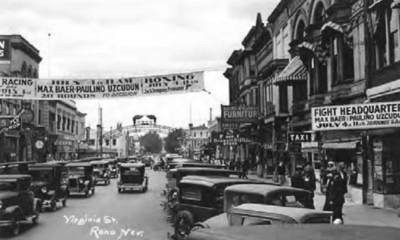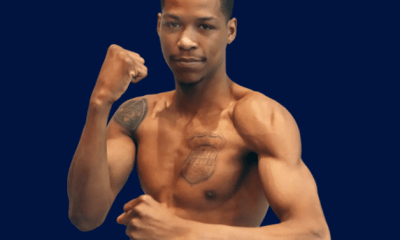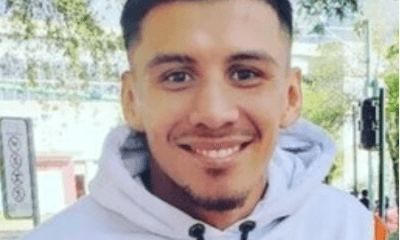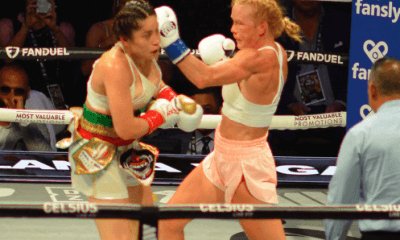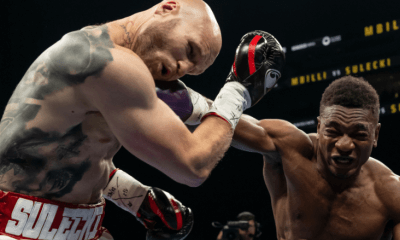Featured Articles
Canastota Chronicles 2024
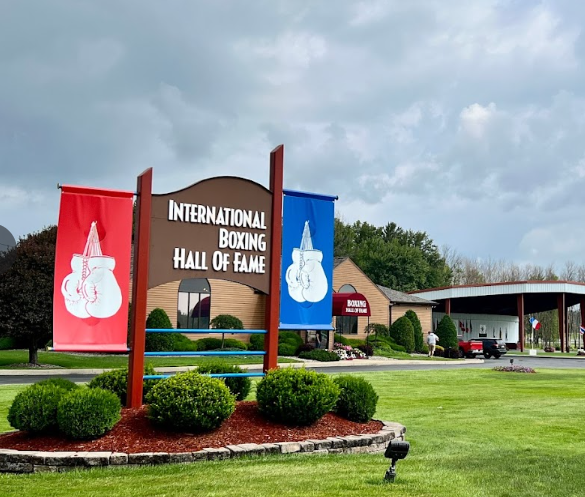
I have been attending at least some part of Boxing Hall of Fame Weekend each year it has been held since 2014. Once again, I made my annual trip to Canastota for three days from Thursday until Saturday. As usual I came back home to Buffalo with memories that will last a lifetime.
Before I get started, I would be remiss if I didn’t mention one of the big reasons I return to Canastota every year. From the folks who work at the Hall of Fame, to the volunteers, to the fans, I have made so many great friends over the years. The open and receptive nature of the Canastota people is something truly special. You feel welcome from the moment you set foot on the grounds until you leave. As always, this year I rekindled old friendships and made many new ones.
With that said, here is my personal experience from the three days I spent in Canastota this past weekend
Thursday
Kind of like a kid at Christmas I did not get much sleep Wednesday night and was up very early on Thursday. I left the house before 7:00 in the morning for the approximate two-and-a-half-hour drive from Buffalo to Canastota. I was on the grounds before 10:00.
After saying hello to many people, I focused in on the ringside lectures which started around 1:00. This year I made it a goal to attend all of them and did just that.
Jackie Kallen kicked things off and talked about how she had to overcome many challenges in a male-dominated sport to get to where she needed to get in her career. She also spoke glowingly of Emanuel Steward who helped get her into the sport and guided her along the way.
Ivan Calderon was next and spoke that he was genuinely surprised to get inducted. He stated that because of his style in the ring along with having limited knockouts, he didn’t think he’d ever get the support needed to get in the Hall of Fame.
Several attendees then got on stage for the opening bell ceremony which was rung by Ricky Hatton.
Finally, the day closed out with Julian Jackson and Jesse James Leija. Both described overcoming challenges in the ring with Leija talking about how he overcame adversity to beat Francisco Bojado and Jackson describing how he found the energy to rally back against Herol Graham.
After the day’s festivities on the Hall of Fame Grounds, I headed over to Turning Stone Resort & Casino. Turning Stone hosts many events for the weekend and is a natural gathering place for those in attendance for Hall of Fame Weekend.
Since there are so many boxing people condensed in such a relatively small area there is a good chance of randomly bumping into someone in the sport. As was my luck, after I arrived at Turning Stone I took a seat in a small lounge that was unoccupied. A few moments later Ricky Hatton came walking into the same area and I got a dream chance to have a short private talk with one of my all-time favorite fighters.
Friday
Michael Moorer kicked things off Friday and though he didn’t go into a lot of details on various topics he did talk about his days at Kronk as well as his relationship with Emanuel Steward.
Jane Couch and Ana Maria Torres were next. Both discussed the challenges they faced breaking into the sport and getting any sort of recognition from the public. Couch was brought to tears while stating that she often fought without getting paid. When pressed as to why she wanted to continue her path in boxing, she responded that it was because she wanted to prove she could make it.
Butterbean was next up. He gave an inspirational talk about how he recently overcame not being able to walk for several years and rededicated his life to getting healthy again. Butterbean also spoke some about his contest with Larry Holmes and said that while he may not have liked Holmes during the build-up to the event, they have since become good friends.
The fist casting was next where the fighters have their fists molded to be housed for eternity at the Hall of Fame.
As the fist casting ended, I waited for my father-in-law to arrive to head on back to Turning Stone to attend the fights that evening. While waiting I started chatting with an individual who looked somewhat familiar to me. After talking for a little bit I got his name, Perry Ballard.
Perry was a professional boxer with a record of 27-2-1 with 20 KO’s and many fight fans may remember him for his fight with Hector Camacho that took place toward the tail end of Camacho’s career. Perry was accompanied by his son Chase to Canastota. Chase is also a professional boxer with a record of 4-1 with 4 KO’s and is currently campaigning as a featherweight. It’s these kind of conversations that I really enjoy during HOF weekend as Perry told me some great stories about his career and Chase talked to me about some of his pro fights. For a fan like me, interactions are priceless.
Saturday
It was back to the HOF Grounds bright and early on Saturday. There is a card/memorabilia show that takes place concurrent with the Ringside Lectures but I wanted to keep to my goal of attending to all the lectures.
Ray Mercer and Lamon Brewster started off the day. Mercer discussed how he recently quit alcohol and had gotten into much better shape.
Brewster spoke very eloquently about specific moments in his career. Of note he talked about his fight with Kali Meehan which was the first title defense for Brewster of the WBO heavyweight title he won from Wladimir Klitschko. Brewster said Meehan was a former sparring partner and while they worked together Brewster had gotten to know Meehan’s family. According to Brewster when he arrived at the Mandalay Bay a few days before the fight Meehan’s family was there in the hotel lobby and Meehan’s kids all ran over to hug him. Brewster said that played on his mind when he got in the ring with Meehan and advised all boxers to never fight their former sparring partners.
Jim Lampley and Ricky Hatton were next on stage. This was certainly one of the best Ringside Lectures I have ever attended. Hatton talked about some of the partying and what made him such a popular figure in the UK. Lampley told a great story about his time at ABC working with Howard Cosell.
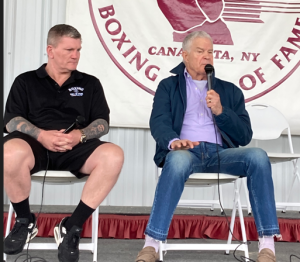
Hatton and Lampley
The referees took the stage after and this panel included Mark Nelson who answered questions regarding how he handled the recent Oleksandr Usyk-Tyson Fury heavyweight title unification fight. Erik Morales then followed and talked about various fights in his HOF career.
Finally, it was Sebastian and Gabriela Fundora’s turn to talk to the fans. While their talk was entertaining, even including Sebastian reminding everyone that he first called out Errol Spence Jr. two years ago here in Canastota during a similar talk, it was what happened afterward that stood out.
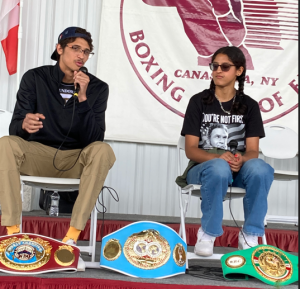
The Fundora Siblings
Usually after participants finish their time on stage, they head off to an area to sign autographs. As noted, the Fundoras’ were last and many people waited around to get their autograph/photo opportunity once their talk concluded. It was a pretty lengthy line and usually participants sign for a little time before heading off.
For well over an hour the Fundoras’ sat and honored every single fan request. And they did not leave the grounds until every fan that wanted to meet them did so. It was quite impressive to witness and they showed why they are such great ambassadors for the sport.
That was it for me. Another year down and already making my plans for 2025. I encourage any boxing fan who has yet to do so to make the trip to Canastota just once for Hall of Fame Weekend. I guarantee it will be an experience that will include so many memories that you will want to keep coming back to Canastota year in and year out.
To comment on this story in the Fight Forum CLICK HERE
-

 Featured Articles3 weeks ago
Featured Articles3 weeks agoAvila Perspective, Chap. 330: Matchroom in New York plus the Latest on Canelo-Crawford
-

 Featured Articles2 weeks ago
Featured Articles2 weeks agoVito Mielnicki Jr Whitewashes Kamil Gardzielik Before the Home Folks in Newark
-

 Featured Articles4 weeks ago
Featured Articles4 weeks agoAvila Perspective, Chap 329: Pacquiao is Back, Fabio in England and More
-

 Featured Articles4 weeks ago
Featured Articles4 weeks agoOpetaia and Nakatani Crush Overmatched Foes, Capping Off a Wild Boxing Weekend
-

 Featured Articles3 weeks ago
Featured Articles3 weeks agoCatching Up with Clay Moyle Who Talks About His Massive Collection of Boxing Books
-

 Featured Articles4 weeks ago
Featured Articles4 weeks agoFabio Wardley Comes from Behind to KO Justis Huni
-

 Featured Articles1 week ago
Featured Articles1 week agoMore Medals for Hawaii’s Patricio Family at the USA Boxing Summer Festival
-

 Featured Articles4 weeks ago
Featured Articles4 weeks agoDelving into ‘Hoopla’ with Notes on Books by George Plimpton and Joyce Carol Oates

